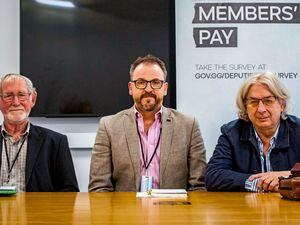'Not sacking thief forced me to leave'
THE prospect of having to work with a thief was too much for Paul Gosney, an industrial tribunal heard yesterday.
THE prospect of having to work with a thief was too much for Paul Gosney, an industrial tribunal heard yesterday. The driver-warehouseman felt humiliated after being forced to accuse another employee, to his face, of stealing.
He quit Ferryspeed CI when he felt that the company refused to take his allegation seriously.
And then, Mr Gosney told the tribunal, he was threatened by management.
He said that depot manager Keith Le Poidevin swore at him in front of others, a claim that was denied.
Mr Gosney said that Mr Le Poidevin had told him: ' ''You better have extremely deep pockets'' and that if I did not keep quiet about this Ferryspeed would make me pay.
'I could not believe this was happening,' said Mr Gosney.
'I had done nothing wrong.
'I could not believe I was being treated like this just for reporting a theft.
'I told him how impossible he had made my position.'
Mr Gosney claimed he had been told that the company did not want the police involved because they did not want the staff member blamed for two thefts.
Police had previously been called in after a customer's parcels had been stolen.
Advocate Jessica Roland, for Mr Gosney, said it was extremely difficult to work together after serious allegations had been made against a colleague.
The hearing was told that Mr Gosney was a trusted keyholder and jointly responsible for health and safety at the company, but a dispute arose in June when it was alleged that a colleague had stolen toilet rolls from one of Ferryspeed's customers, Pound World.
Mr Le Poidevin was on holiday and Christopher Dodd was acting manager.
The allegations were reported to him on a Saturday but he said he would leave the matter until the Monday.
Mr Dodd said: 'To me it seemed like a bit of a wind up.'
Days later management gave the accused a serious verbal warning, but Mr Gosney was unhappy at what he saw as a lack of action.
'I felt I had been made to keep my mouth shut about something that was morally wrong,' Mr Gosney said. He worked in a bonded warehouse where security and vigilance were absolutely essential.
Advocate Roland added: 'This particular management did not do their duties. They had not taken these allegations seriously.'
She questioned how Ferryspeed's actions could be deemed good employment practice.
Advocate Roland said that an employer should not act in a manner likely to destroy or seriously damage the relationship of trust and confidence with staff.
She argued that her client would show that the company's conduct entitled him to resign and sue for constructive dismissal.
The claim is opposed by Ferryspeed.
'It's the respondent's case that the applicant was not unfairly dismissed constructively or otherwise,' said Advocate Tom Crawford, for the logistics firm.
'He resigned in his own anger because he resented a decision made regarding a fellow colleague and he was intending to resign anyway for reasons unconnected with the respondent's conduct.'
Ferryspeed's efforts to get the hearing to sit in private failed.
Advocate Crawford wanted the case heard in camera because Ferryspeed feared its reputation could be damaged.
He believed the applicant would be concentrating on the theft of goods from a customer, was unhappy that the Guernsey Press had taken Mr Gosney's picture before the hearing, and questioned whether the applicant was trying to seek an advantage.
Advocate Roland argued that justice must be seen to be done, which was why the States decided to make industrial tribunals open.
And after a short adjournment adjudicator Barry Ferguson opened the case in public.
At the end of yesterday's session, the case was adjourned. It will resume on a date to be fixed.





